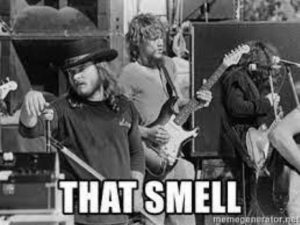Cheaters Always Get Busted – OOH, OOH That Smell; Can’t You Smell That Smell!

A donor came in for a Federal DOT (department of transportation) test, and, had you walked in behind him, you would have thought we were a marijuana dispensary. We concluded he must have been smoking in his vehicle because the odor was so strong. For reference, marijuana is still federally illegal and DOT employees (truck drivers) are not allowed to use it. We proceeded to start the regulated drug test already very suspicious based on our senses. The donor produced a specimen we would not accept because it had a strong ammonia smell.
As is regulation, we package the first specimen. Once it was sealed, we turned to the donor and dropped “the bomb” on him telling him he would have to produce a second specimen, this time under direct observation procedures as required. Like most donors he argued profusely with the collector regarding her decision not to accept the first specimen; the collector stuck to her guns simply answering his challenges by repeating “I do not think it came out of your body.” As with most cheaters, he became belligerent and left the clinic. That constitutes a refusal to test by DOT definition.
According to regulations, refusals can be determined by 2 persons – the DER or the MRO. The DER (designated employee representative) works for the employer (our customer) who sent the donor to test and is most often human resource manager or supervisor. The MRO (medical review officer) is a doctor trained in DOT drug testing and who oversees the program for employers. The MRO normally only gets involved if a specimen is sent to the lab and the lab reports the specimen as adulterated or substituted (they cheated at the clinic and the lab caught it). In this case, the MRO will almost always determine the test to be a refusal because the donor “refused” to provide unadulterated urine from their own body. This donor’s refusal by leaving the clinic before providing a specimen the collector would accept is determined by the DER. We (the collector) provide the DER with written documentation of what took place and the DER “makes the call”. Obviously, this attempt was a “classic” refusal; however, the DER said (in writing) it was not a refusal.
This is in direct violation of Federal regulation and if ever audited this employer could face stiff penalties; including up to $10,000/day for every day this cheater drives a truck for the employer. This is not the first time we have witnessed a DER go directly against regulation and determined a “dead to rights” refusal was not a refusal.
Our DOT cheater returned to the clinic about an hour later toting a bottle of yellow ammonia that was about 1/2 empty and marched into the clinic and belligerently exclaimed “see, I told you I was cleaning with ammonia all day that’s why my pee smelled like ammonia” and stormed out. Not sure what he hoped to accomplish, but I guess it made him feel better? We trust our senses; the sense of smell is just one of them. Do the clinics you use have collectors with “sense”?
